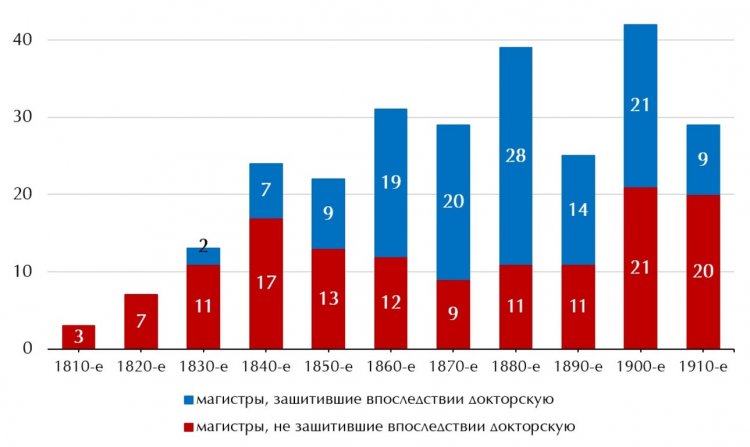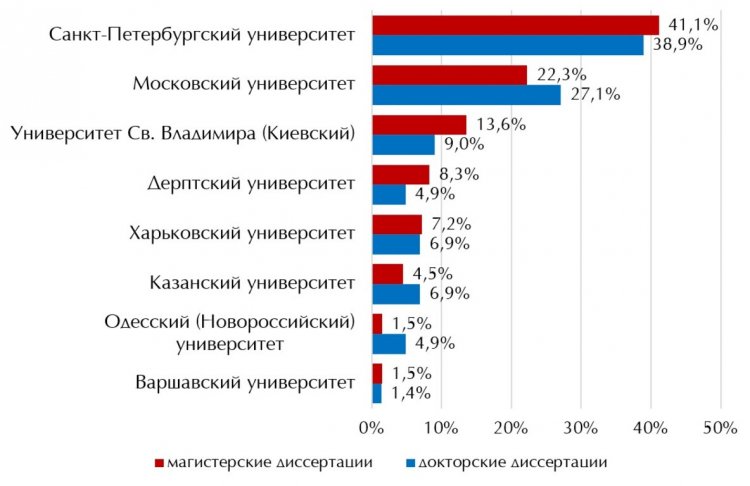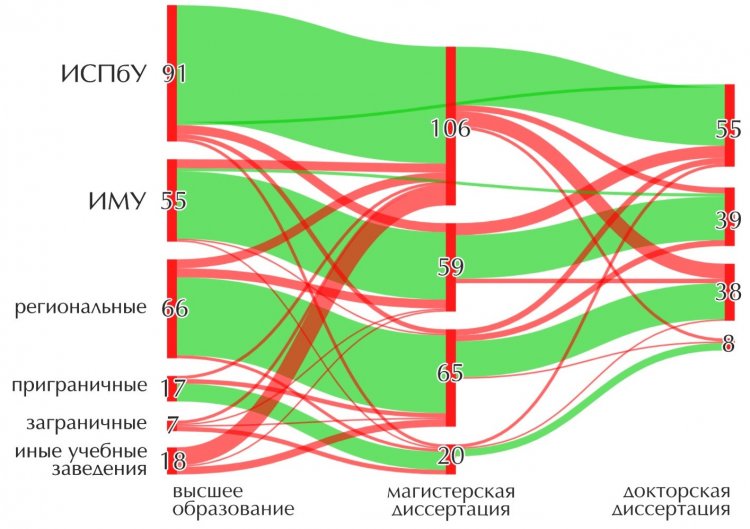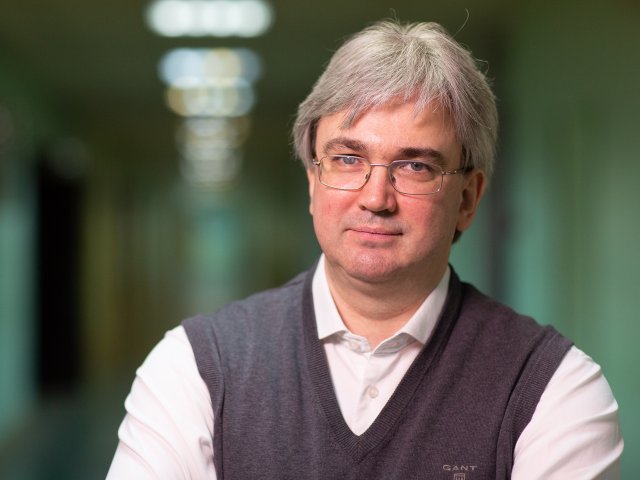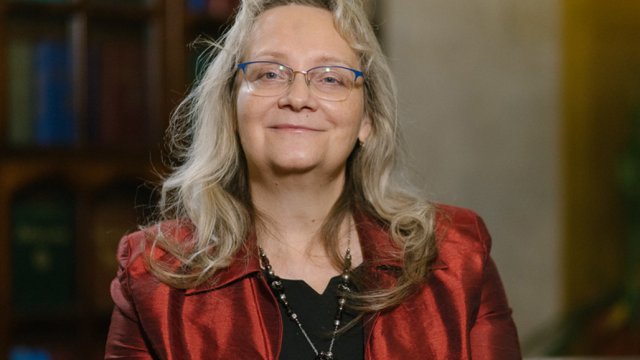Chelyabinsk scientists are researching the subject of the Russian dissertation culture of historians of the 19th – early 20th centuries, considering the specifics and conditions for obtaining scientific status in the context of epochs
Entering the academic environment requires the preparation of an original qualification work – dissertation research in a certain discipline. The right of the author of scientific work to academic competence and the acquisition of a higher scientific status means compliance with the relevant serious requirements for work and recognition by authoritative scientific colleagues of the latest scientific achievements and their significance from the point of view of science. Over the past centuries, the structure of writing a dissertation, the culture of organizing and conducting dissertation debates, the opposition strategies necessary to obtain a degree have changed due to various reasons and circumstances, but in one way or another, they have served as the basic components for the current dissertation system.
The long-term research of scientists of Chelyabinsk State University (CSU, Chelyabinsk) addresses the origins of the formation of dissertation culture in the field of the development of disciplines of historical knowledge. Specialists study the formation and features of the development of domestic intellectual traditions in the academic community of the 19th – early 20th centuries; in particular, they consider the problems of scientific research activities of scientists in the field of history and the creation of a special type of works – dissertations that assigned them a particular scientific and official status. Because of this, the procedure and process of defending a dissertation, the acquisition of professional competencies, and academic degrees by applicants have become the subject of the special research efforts of Chelyabinsk historiographers. The analysis of the mechanisms of functioning of intellectual communities at different times and in different historical circumstances of Russia contributes to the preservation of the national intellectual heritage and determines the vector of the modern dissertation system.
Scientists of Chelyabinsk State University – Natalia Nikolaevna Alevras, Doctor of Historical Sciences, Professor of the Department of Russian and Foreign History of the Faculty of History and Philology, and Natalia Vladimirovna Grishina – Candidate of Historical Sciences, Associate Professor, Dean of the Faculty of History and Philology – explained their understanding of the dissertation system in the community of historians and its transformation in certain chronological periods of Russian history, and in particular, revealed the significance of dissertation culture and changing requirements for the creation of its main intellectual product – dissertations, as well as outlined the nature and subject of the works of the dissertators-historians.
“In modern humanities, there is an idea of intellectual history as a specific field of knowledge aimed at studying human creative activity. The formation of intellectual history is associated with the ideas and works of the famous American philosopher and historian Arthur O. Lovejoy, who in his book The Great Chain of Being (1936) succinctly defined his scientific theory as the History of an Idea. He was interested in the processes of formation and the essence – or “biography” – of ideas in various fields of knowledge, primarily philosophical. In the center of his attention was a philosopher, a scientist developing scientific knowledge. In the second half of the 1990s, a project on the history of intellectual culture was developed in Canada (University of Calgary), which focused on the role of the professorship in university communities and the life of society as a whole.
The revival of interest in Lovejoy’s stance and methodology in Russia occurred at the beginning of the 21st century, in the research of Professor, Corresponding Member of the Russian Academy of Sciences Lorina Petrovna Repina. She also considered intellectual history in the context of the methodological principles of cultural history. In 2001, on the initiative of L.P. Repina, the Russian Society of Intellectual History (RSIH) was established, bringing together more than 30 regional organizations. The conductor of the ideas of the new intellectual history was the well-known periodical/journal of interdisciplinary profile Dialogue with Time, the first issue of which saw light in 1999 with L.P. Repina’s famous article What is intellectual history?
Subsequently, it became clear that the processes associated with the intellectual activity of a person (intellectual culture) permeate their entire living space and, of course, go beyond the purely academic environment. Therefore, intellectual history is at the same time a specific approach to the study of the past, focused on the accentuation of intellectualism as an organic part of the nature of the human activity and intellectual phenomena created by man, both at the personal and collective levels.
At the present stage, the study of the phenomena of intellectualism in different perspectives of its manifestation in human life gives reason to believe that the subject of intellectual history is “all kinds of human creative activity (including its conditions, forms, and results) in the general intellectual space and the long term.” At the same time, it is worth noting that the intellectual environment of scientific communities of various institutions and disciplinary orientations is localized in most cases in university and academic structures. Anyway, since the 1990s it is these communities of scientists that primarily interest researchers who adhere to the principles of the historical and intellectual approach,” Natalia Alevras and Natalia Grishina pointed to the existing research interest among foreign and domestic scientists in the study of the history of intellectual culture.
The subject formulated by Russian authors as dissertation culture, according to Natalia Grishina, was laid “as a kind of scientific trend at the turn of the 20-21 centuries. It was then that a historiographical community of Chelyabinsk historians began to form within the walls of Chelyabinsk State University on the initiative of Natalia Nikolaevna Alevras, focused on the implementation of the ideas of cultural and intellectual history. One of the results of this internal nascent process was the preparation and defense in 2004 of my Ph.D. dissertation V.O. Klyuchevsky school in the cultural space of pre-revolutionary Russia. Fruitful scientific cooperation with the Omsk historiographical school, the leader of which is Professor of Omsk State University Valentina Pavlovna Korzun, has become of great importance for the formation of “Chelyabinsk historiography.” Omsk historiographical conferences of the 1990s–2000s, with their interest in the history of the formation of scientific schools in Russian science (as intellectual and cultural phenomena), became the first approbation of the future topic, which we subsequently developed as an original project.
As Natalia Alevras emphasizes, “it was the scholarly processes in the university space of Russia, most pronounced in the post-reform period of Russian culture, that created the interconnected phenomenon of “Teacher – Students.” The “Teacher” – a recognized scientist – acted as a kind of moderator of the research activities of “Students” who were just entering the scientific path and focused at this stage on the development and defense of master’s theses. The defended thesis and the recognition of the graduate’s merits by the intellectual environment became a kind of access key of the newly born scientist to the scientific community. The doctoral dissertation strengthened the academic positions of renowned scientists, many of whom were recognized as the founders of scientific schools.”
The first decade of the 21st century became for the creative team of CSU – the future developers of the problems of dissertation culture – a time of searching for their place in the intellectual space of fellow historians who worked in related issues. The year 2010 became a milestone: after special visits to the capital’s archives and libraries, scientists presented the article Dissertation culture of Russian historians of the 19th – early 20th centuries: the idea and sources of the research project to the Omsk historiographical collection The World of the Historian, where for the first time they introduced the conceptual construct of dissertation culture,” the meaning and definition of which were substantiated somewhat later in other articles.
It took the scientists of Chelyabinsk State University at least 10 years of collective work to turn the original author’s ideas into a holistic and completed project of observations and research efforts. Thus, within the framework of the RFBR grant project Dissertation culture of the Russian historical and scientific community: experience and practice of preparation and defense of dissertations (19th – early 20th century) Ural researchers have also prepared a monograph with the same name. The book is dedicated to the dissertation culture of Russian universities as a phenomenon of the scientific life of the corporation of historians of the period when the process of formation and development of the Russian university system took place.
The team of authors was made up of employees of Chelyabinsk State University. The editors and authors of a number of sections of the monograph were Doctor of Historical Sciences, Professor Natalia Nikolaevna Alevras and Candidate of Historical Sciences, Associate Professor of the Department of Russian and Foreign History, Dean of the Faculty of History and Philology Natalia Vladimirovna Grishina. Separate structural parts were prepared by Candidate of Historical Sciences Olga Viktorovna Bogomazova, Candidate of Historical Sciences Artem Mikhailovich Skvortsov, Senior Lecturer of the Department of Political Sciences and International Relations Oleg Vladimirovich Vydrin. Ksenia Mikhailovna Belik, a graduate of the Faculty of History and Philology of CSU, and now a graduate student of the Poletaev Institute for Theoretical and Historical Studies in the Humanities of the HSE, took an active part in the publication.
The monograph is addressed to a wide range of humanitarians in the field of problems of the history of historical science, the history of universities, the study of the characteristics of corporate university communities, and the career histories of scientists.
According to Natalia Alevras and Natalia Grishina, “for the first time in historiographical practice, the book presents an analysis of the database of 280 dissertators and 409 dissertations of historians of Russian universities. The structural parts of the monograph are dedicated to subjects that have already attracted the attention of researchers (in particular, the interpretation of Russian legislation that determined the status of a dissertation as a scientific work, the regulatory rules for its presentation in the form of a dissertation dispute), and aspects that are still poorly studied. For the first time, a broad historical and scientific canvas of the researched experiences of creating dissertations, the traditions of organizing dissertation debates are presented, the practices and culture of opposing dissertations are analyzed. The institution of opponents is presented in the monograph as the most important actor of dissertation culture. In addition, the experience of studying the assessments and self-assessments of dissertations by contemporaries in sources of personal origin is proposed. A special aspect was the study of the specifics of the comments on the most famous dissertation works.”
What should be understood by dissertation historical culture?
“To designate the subject of research, we use the concept of dissertation culture without the adjective “historical.” But in our research, we project its potential into the field of study of one of the disciplinary/scientific communities – historians, linking our research with the history of historical science or with historiography as a disciplinary component of historical knowledge. At the same time, the research we have undertaken, and the methods developed for studying dissertation culture as a phenomenon can be applied to other disciplinary (scientific) communities. This is possible and expedient, as, since the 19th century, Russian universities have introduced general rules and norms for the training of highly qualified scientific personnel who confirmed their scientific status and their corresponding place in the hierarchy of academic degrees and university positions precisely by defending dissertations in various fields of scientific knowledge. In the 19th – early 20th centuries, dissertations were defended only at universities. Though since the 1860s, Theological Academies have acquired such a right (but we do not touch on these subjects in the monograph).
The concept of dissertation culture/system is undoubtedly a scientific construct developed in 2010 by the authors of the project as a result of the search for an adequate conceptual category that would express the meaning of the phenomenon being studied and, at the same time, correspond to the scientific principles and approaches shared by the members of the scientific team. The approaches were formed in the context of the “scientific turns” experienced at the turn of the 20-21 centuries and the new perspectives of history and methodological ideas of its comprehension mastered by the community of historians. In particular, the ideas and principles of “new” histories: social, intellectual, “cultural,” personal, etc. are of fundamental importance for the development of the proposed issues. The strategy of the communicative approach has largely determined the leading principles of the study of dissertation culture as a phenomenon based on the activities and interaction of numerous institutions and personalities/actors of scientific culture. Based on the well-known idea formed in the late 19th – early 20th century about science as part of the culture, the phenomenon under study is also considered from a phenomenological point of view. From the standpoint of the phenomenological approach, dissertation culture appears as a phenomenon that has left a system of certain “material/intellectual products” in the scientific heritage (O.M. Medushevskaya, 2008), allowing to recognize the structure and present its integral semantic expression.
The quintessence of the phenomenon being studied, of course, is the dissertation as an “intellectual product”. But being the final result of sometimes very long efforts to create it, accompanied by the public defense and scientific expertise, this process generated the emergence of a whole set of other “products” of creative activity of both the dissertator and his expert opponents/reviewers. Therefore, our first experience of immersion in the study of dissertation culture was associated with accents in the field of identifying works, the emergence of which accompanied the course and results of work on dissertation research. It is the totality of the material products/works that have arisen that makes up the empirical backbone of the dissertation culture construct. It is clear that they also represent the source basis for the study of this phenomenon. In a number of publications, we have tried to reconstruct, rank, and analyze this source set,” Natalia Alevras explained in detail.
Complementing her colleague’s answer, Natalia Grishina clarifies: “We position the dissertation culture as an organic part of the university system, considering it as an integral locus of the general university culture. The given angle made it possible to catch in its structure this element, previously unnoticed in universitology. But it was endowed with its own special function and provided with an appropriate regulatory framework, most of all expressed by a system of successive Provisions on academic degrees (1819-1864). The phenomenon of dissertation culture, as already noted, is closely related to scholarly processes. It includes the entire event and semantic spectrum of phenomena associated with the creation of dissertation research, the emergence of dissertation stories occurring in the context of circumstances of normative and informal origin, as well as various, in this regard, scientific and organizational procedures and life vicissitudes of representatives of the scientific community.
The appeal to the search for a definition of the phenomenon under study was also undertaken for the adaptation of modern historians (including self-adaptation) to such a phenomenon of university life, which, within the framework of its formation and existence in the pre-revolutionary practice of the 19th – early 20th centuries, and subsequently in historiographical experience, had no special designation.
In our joint 2011 article (See: DIALOGUE WITH TIME: ALMANAC OF INTELLECTUAL HISTORY. Moscow: IGH RAS, 2011. ISSUE 36. p. 222) we have tried to give the most general definition of dissertation culture: “The dissertation culture is proposed to be understood as a set of organizational procedures, traditions, and rituals on the part of scientific and educational institutions, the expert community and interested applicants for achieving scientific status, aimed at obtaining a research product (work) that meets the accepted qualification requirements and professional certification standards.” Methodological approaches to the development of the concept of dissertation culture were further substantiated in 2014 by Natalia Alevras.”
Why does the subject of the dissertation as a phenomenon of the scientific life of the scientific community remain poorly studied in the Russian research field?
“In no case can we assume that the subject related to the interest in dissertation research has not been considered by anyone except our creative group. Since the 1980s, both Russian and Western European historians have been focusing on the history of the creation of dissertations in pre-revolutionary Russia. I will very briefly outline the main milestones and names of Russian researchers who made their pioneering contribution to the study of the issues that we renew: in the 1980s – E.V. Soboleva (1983); G.G. Krichevsky (1984, 1985); in the 1990s – A.E. Ivanov (1991, 1994); P.V. Volobuev (review of Ivanov’s monograph, 1996); V.I. Chesnokov (1995,1996); E.A. Rostovtsev (1999). Separately, I will highlight the wonderful works of Western colleagues close to our problematics: articles by T. Emmons (1990, Russian) and T. Sanders (1999, English; 2012, Russian); monograph by T.M. Bohn (1998, German; 2005, Russian). A surge of interest in the subject of dissertation defenses occurred already in connection with our first article in 2010. The editorial board of the collection The World of the Historian (Issue 6. Omsk, 2010), along with this publication about dissertation culture, simultaneously presented a selection of more than 10 articles related in one way or another to the problems of creating and defending dissertations in the Russian scientific tradition. In this scientific action, we felt the intellectual support of the project we are developing.
A group of employees of the Center for University Studies of the Poletaev Institute for Theoretical and Historical Studies in the Humanities of the HSE (Professor E.A. Vishlenkova, her students K.A. Ilyina, K.M. Belik, etc.) was also associated with the subject of dissertations. A series of their articles and monographs focused on the study of the processes of formation of the scientific environment and academic culture was a productive experience in the implementation of ideas in the field of university studies, cultural and intellectual history. A certain scientific reaction to the cycle of our ideas on dissertation culture can be considered a new book by A.E. Ivanov Academic Dignity in the Russian Empire. 17th – beginning of the 20th century (2016).
We hope that the totality of ideas and research expressed by the Chelyabinsk group of historiographers contributed to the renewal of the approaches of their predecessors: the creation of a representative source base, the development of innovative scientific tools, and a balanced theoretical and methodological approach to the study of dissertation culture, including the justification of this scientific concept introduced into scientific circulation for the first time,” commented Natalia Alevras.
As a result, Ural scientists created a database of dissertations and dissertators, which included information about 409 history dissertations and 280 dissertators within 1813-1919.
“It should be emphasized that its creation is based on the well-known typewritten bibliographic index manuscript of G.G. Krichevsky Dissertations of Russian Universities. 1805-1919 (Moscow, 1984). The manuscript is stored at the INION Library. Krichevsky’s index recorded dissertation defenses in all scientific specialties in pre-revolutionary Russian universities. The value of the index as the main source of information for creating a database is hard to overestimate. But it should be stated that the contents of the reference book of this well-known bibliographer are presented in the form of raw factual material that has not been subjected to any analytical processing. Note also that Krichevsky’s index has some information gaps.
We emphasize that our creative team, for the first time in the practice of using Krichevsky’s index, had the idea to process part of his bibliographic material on the example of a set of dissertation defenses by historians. We hope it was possible to do this, relying on modern information technologies used in humanities to create databases. During its development, the task was to create a collective portrait of dissertators-historians and identify the dynamics of their dissertation activity in the chronological range of 1813-1919. Other variables were also used, which made it possible to present in tables and diagrams a comprehensive picture of the features of the dissertators’ corpus and the nature of their dissertations,” said Natalia Alevras and Natalia Grishina.
Figure 1. Academic careers of masters (by the decades in which master’s theses were defended).
The researchers pointed out the revealed pattern: out of the above-mentioned total number there are more master’s than doctoral theses defenses (264 and 145, respectively).
As Natalia Grishina notes, “the leader in defenses was St. Petersburg University, where 107 master’s and 57 doctoral dissertations were positively evaluated as a result of dissertation debates. The second place was taken by Moscow University with 59 masters’ and 39 doctoral dissertations. At the same time, it should be understood that not only applicants who graduated or worked at these universities defended dissertations there. In the 1880s, major universities (Moscow and St. Petersburg) became centers of attraction for applicants from other university cities. Of the 13 dissertators identified by us (we are talking about the 1880s) who defended their master’s thesis at another university, 5 debates were organized in St. Petersburg, 3 in Moscow. The same trend can be observed in the 1910s. Out of 12 applicants for a master’s degree who defended not at their alma mater, 6 debates were organized in St. Petersburg, 2 in Moscow.
The opposite trend was also observed. Some applicants from Moscow or St. Petersburg chose a regional university for dissertation defense. The considerations could be different. For example, S.F. Platonov, who after gaining his master’s thesis (1888) became the head of the Department of Russian History and the founder of the Club of Russian Historians in St. Petersburg, could not defend his doctoral dissertation at his university, because at that time (1899) there were no doctors of Russian history at the university who could act as experts on his dissertation. Therefore, Platonov defended his dissertation at Kyiv University. V.I. Semevsky (St. Petersburg) was denied defense for political reasons. His dissertation about peasants seemed very acute and was perceived as “free-thinking,” so he, having coordinated his defense plan with V.O. Klyuchevsky as his alleged opponent, organized a dispute at Moscow University. Associate Professor of St. Petersburg University I.P. Senigov, who, according to experts, wrote a “weak” dissertation, was refused in St. Petersburg and Moscow. His debate was organized at Kazan University. Similar examples can be provided.”
Figure 2. Share of dissertations by place of defense.
Regarding the problematics, according to the observations of Chelyabinsk scientists, “dissertations on Russian history and universal history were the most popular scientific specialties and accounted for more than 60% of all defenses. At the same time, a significant proportion of the defenses were dissertations on verbal sciences. These were usually defended by applicants who worked on subjects of ancient history that required knowledge of ancient languages. As a result, they, in the modern sense, joined the ranks of generalist historians. We emphasize that in all universities, except St. Petersburg and Dorpat, dissertations on Russian history prevailed over other historical specialties.
The distribution of dissertations according to the chronological principle shows that the applicants paid the greatest attention to medieval European history (108 master’s and 61 doctoral dissertations). In second place for masters was ancient history – 84 dissertations, and for doctors, modern history – 45 dissertations. It should be noted that the desire of dissertators to go beyond the scope of the Middle Ages and turn to the study of the period of the 18th century, which was poorly developed at that time and from a methodological point of view fundamentally important for understanding modernity, was most characteristic of Moscow University.”
Figure 3. Trajectories of academic careers and “dispute migration.”
What was the significance of the dissertation as scientific work in the regulations on academic degrees in the 19th century? What were the principal innovations?
“It was not immediately in the process of forming the university system in Russia since the beginning of the 19th century that the scientific community worked out the rules for preparing dissertations for defense and the principles of their presentation and scientific expertise normalized by the Ministry of Education. Although since the beginning of this century, a system of public dissertation debates has already been practiced. The Regulation on Academic Degrees of 1844, developed on the initiative of the famous Minister of Public Education S.S. Uvarov based on the previously adopted university charter of 1835, can be considered innovative.
The Charter and the Regulation clearly defined for the first time the place of dissertation work in the system of other examination tests of applicants for academic degrees. It was the dissertation as the result of creative scientific activity that began to be considered as the main proof of the professionalism of the scientist. The Regulation of 1844 for the first time raised the question of scientific examination of each defended dissertation, creating an institute of experts (two for each dissertation), initially called objectors. Already in the 1850s, this designation would be replaced by the Europeanized term opponent, but the term objector that originally arose clearly emphasized the meaning of the dissertation dispute. The applicant would get from the opponents, first of all, a system of “objections.” At the debate, a kind of initiation ceremony began, when the applicant was pelted with numerous questions and comments by the experts, testing the depth of their knowledge, intellectual abilities, and erudition that allowed them to resist and “save face” in this scientific tournament.
In the 1860s, during the reforms, a new charter (1863) and the Regulation on Academic Degrees (1864) were adopted, which were based on several norms of 1835-1844 and, of course, subjected them to further development. The main accents of the normative acts were focused on expanding the circle of persons who received the right to write and defend dissertations, as well as on the principle of publicity of dissertation disputes. These debates became an attractive place of the university space for members of the public in university events of this nature. The “concept of dispute” of Russian universities, as noted by the American historian T. Sanders, in the face of the scientific community acquired a specific function of a “third opponent,” influenced by its reaction during the defense of dissertations on the final decisions on the part of faculties about the fate of the applicant, as well as their scientific reputation,” the scientists informed.
At the beginning of the 20th century, with the change of the political system, the Russian dissertation system underwent significant changes and even temporarily interrupted the continuity of the pre-revolutionary system of preparation and defense of dissertations with the Soviet system.
As Natalia Grishina noted, “in the early Soviet period, after the abolition of academic degrees and titles in 1918, the system of awarding academic degrees was artificially destroyed. Its restoration took place gradually: in the 1920s, the question of a doctor’s degree was debated, in the early 1930s the Higher Attestation Commission was established, in 1934 the degree of Candidate of Sciences was introduced. But these vicissitudes did not lead to the destruction of the dissertation culture as a set of scientific values that were formed in pre-revolutionary times, and as a manifestation of the power of scientists in evaluating scientific works and allowing the applicants into the circle of “their own.” This is evidenced by numerous debates held in the 1920s when there was no normative side to awarding academic degrees. During this period, the debates had primarily a symbolic meaning, they can be considered as a kind of initiation rites of neophytes. The organization and participation in such a dispute did not give an academic degree but ensured the recognition of scientific ideas among colleagues in the workshop, made the applicant visible in the scientific community. We emphasize that in the 1920s, disputes were organized with all the elements of defending dissertations that existed before 1918: publication and distribution of the text of the dissertation, an announcement of the defense, opponents and their feedback, recognition of the defense as satisfactory. The only element missing was the award of an academic degree.”
Nevertheless, the time gap in the normative side of the dissertation system, according to the CSU researchers, “was not so large that its practical side was forgotten. When at the turn of the 1920-1930s they started talking about the need to restore it, apparently, they did not “reinvent the wheel.” By and large, the Soviet dissertation system was created according to previously valid pre-revolutionary rules. This is confirmed by the regulations of 1937 and 1938, as well as by some transcripts of dissertations carried out at the turn of the 1930-1940s that we studied. The only innovation that has become increasingly important over time has been the centralization of this system and the Higher Attestation Commission’s approval of the acquisition of an academic degree. Of course, the devil is in the details. And this moment of centralization and bureaucratization in some cases overshadowed the scientific component of dissertations and debates. It has become more important to observe all formal procedures, to present an ideologically sustained work with a proven system of argumentation and a familiar conceptual apparatus. It seems to us that this overformalization has become the main motive for the recent reform of the dissertation system. And now, in fact, we have several options for acquiring an academic degree: from discussing a dissertation by a narrow group of specialists on the subject with the mandatory involvement of foreign colleagues to the traditional passage of a dissertation through dissertation councils that comply with the requirements of the Higher Attestation Commission. It can be stated that very interesting cases have appeared, for example, the practice of organizing defenses at the HSE or St. Petersburg State University.”
“I would like to note that the scientific community is very sensitive to retaining the power to recruit new scientists. In fact, by supervising a graduate student or an applicant, examining a dissertation, deciding as a member of the dissertation council, a scientist demonstrates their understanding of the ethos of science,” Natalia Alevras emphasized.
Thus, the accumulated experience and practice of the Russian dissertation historical culture have formed certain procedures and regulatory framework for the modern scientific community, which contribute to the advancement of the dissertation/degrees to the intended goal and obtaining the highest scientific qualification, meeting, of course, the value criteria for determining the level of scientific achievements for the academic title.
All images are provided by Natalia Alevras, Natalia Grishina
